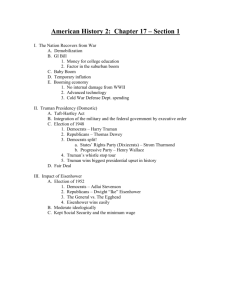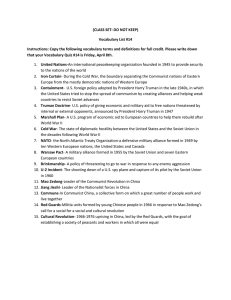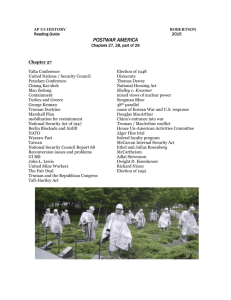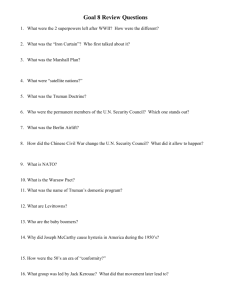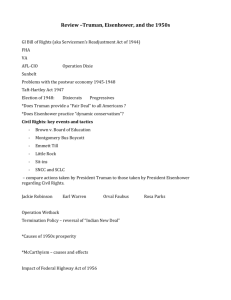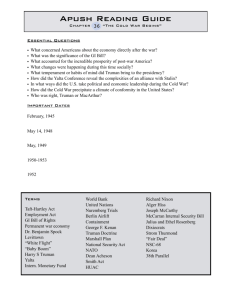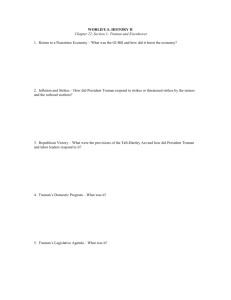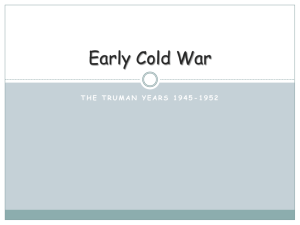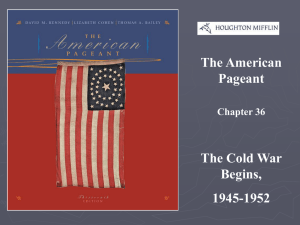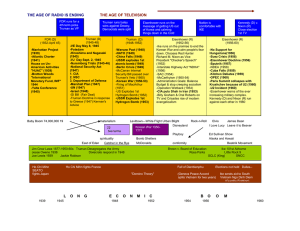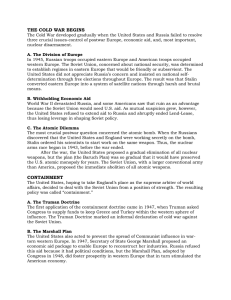Origins of the Cold War and the 1950s
advertisement
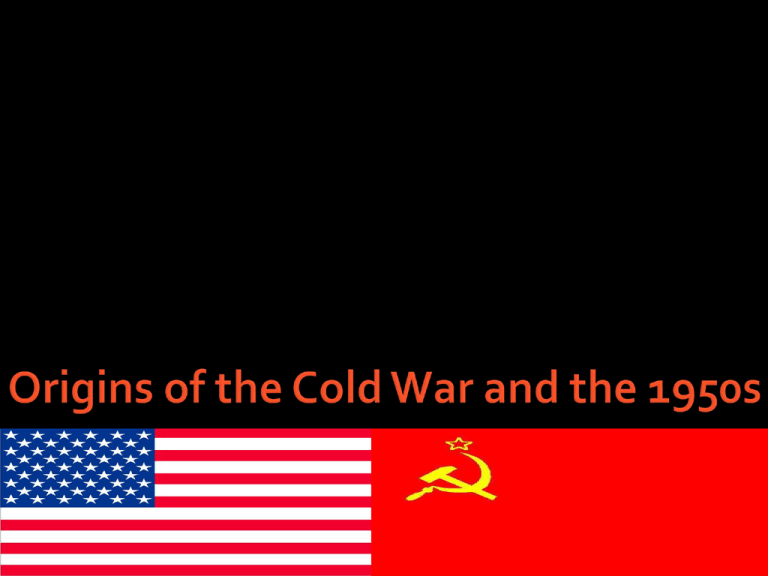
At the conclusion of World War II, the celebratory shouts of Americans could be heard around the globe. However, the Great Depression was not too far removed, and questions of economic stability were in the forefront of American minds. The cheers began to fade entirely when the Soviet threat reared its ugly head and Americans gripped for another international conflict. The Cold War did not result in direct conflict with the Soviet Union; however, it did lead to anxiety at home and proxy wars abroad. Tensions mount ▪ Spies from Moscow! The Loyalty Review Board ▪ Investigates 3 million government employees ▪ 3,000 resign or are dismissed—evidence withheld Smith Act of 1940—antisedition law ▪ Dennis v. the United States 1951 House Un-American Activities Committee (HUAC) ▪ The Hollywood Ten (1947) ▪ Blacklisted ▪ Alger Hiss convicted of perjury 1950 McCarran Internal Security Bill 1950 ▪ Internal security emergency ▪ Truman vetoes Ethel and Julius Rosenberg ▪ Executed 1953 McCarthyism Joseph McCarthy (R)—WI ▪ Falsely accuses people of communist ties ▪ Political currency ▪ Controls personnel policy in the state department Attacks Army Officials ▪ Senate condemns him Soviets detonate A-bomb in 1949 U.S. develops Hydrogen bomb (1953) ▪ Thermonuclear bomb 1,000 times as powerful as the atomic bomb ▪ U.S.S.R explodes one six months after Both nations stockpile nukes “New Look” ▪ Condemns containment Secretary of State: John Foster Dulles ▪ Roll back communist gains ▪ “Brinksmanship”—MAD ▪ mutually assured destruction Strategic Air Command (SAC) ▪ Curtis Lemay Nikita Khrushchev takes the Soviet helm Rejects “open skies” (1955) Hungarian uprising (1956) ▪ Soviet intervention—kills 30,000 ▪ Eisenhower does nothing Europe: ▪ West Germany joins NATO (1955) ▪ Warsaw Pact created (1955) Iran—Oil! ▪ resists Western corporations ▪ C.I.A. stages coup and installs Shah Pahlevi Egypt Suez Crisis ▪ Gamal Abdel Nasser (president)— funds for Aswan High Dam ▪ Nationalizes Suez Canal—upsets French and British ▪ French, British, and Israel attack Egypt U.N. peacekeepers brought in Eisenhower Doctrine—no commies in the Middle East ▪ Oil and nationalism Organization of Petroleum Exporting Countries (OPEC) Created in 1960 Readjustment ▪ ▪ ▪ ▪ Returning soldiers GNP slumps Inflation—33% Strikes ▪ Taft-Hartley Act (1947)—outlaws “closed” shop Government actions ▪ Sold war factories and gov’t. installations ▪ Employment Act (1946) ▪ The GI Bill of Rights ▪ Education and housing loans Government policies ▪ Federal Housing Administration (FHA) ▪ Veterans Administration (VA) ▪ Tax deductions for interest on mortgages Suburban homes ▪ “Levittowns” “White Flight” ▪ Racial prejudice ▪ Hurt cities economically ▪ Government aided in the solidification of segregation Population redistribution ▪ Mobile populace Sunbelt ▪ Jobs, climate, lower taxes ▪ Redraws political map ▪ Tax dollars Public Works Interstate Highway Act of 1956 Harry Truman President’s Commission on Civil Rights ▪ Asks for: ▪ Federal anti-lynching law ▪ Banning the poll tax ▪ Permanent civil rights commission ▪ Congress denies Executive Order ▪ Integrates the armed forces (1948) Professional sports ▪ Starts integration ▪ “Tokenism” Republican situation ▪ Control both the House and the Senate ▪ Re-nominate Dewey Democrats split ▪ “Hand me down Harry”—unwanted ▪ Truman gets nod: Democrats cannot woo Eisenhower ▪ Henry Wallace—Progressive ▪ denounces “dollar imperialism” ▪ Interpreted as pro-Soviet ▪ Strom Thurmond— “Dixiecrats” ▪ Hates Truman’s Civil Rights agenda Truman “whistle stops” ▪ “do nothing” congress ▪ Farmers, workers, blacks—New Deal Coalition Truman wins in an upset! ▪ Promotes “Fair Deal” Defined: 50 million children born in the United States in the decade and a half following WWII. Boomers in society: Education “Youth Culture” Social Security Leisure and Affluence ▪ Diner’s Club, McDonald’s, Disney Land, etc. The television 1960—90 % of Americans own this new medium ▪ Commercials ▪ Televangelists Business ▪ Franchise ▪ Conglomerates ▪ Planned obsolescence Rock and Roll ▪ Black and white ▪ Loosens mores “Dynamic Conservatism” ▪ Liberal when dealing with people ▪ Conservative when dealing with money or government Less Government ▪ “Creeping Socialism” ▪ Rolled back Truman military buildup (still 10% of GNP) ▪ Transfer of oil fields to state governments ▪ Encourages private sector to challenge TVA ▪ Refuses free distribution of Salk’s polio vaccination Operation Wetback ▪ Deportation of Mexican “illegals”—1 million in 1954 Public Works Interstate Highway Act of 1956 ▪ $27 billion—42,000 miles

